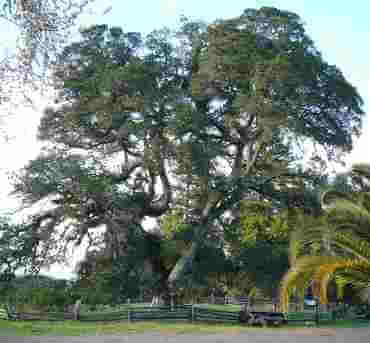Tree

In general, trees represent the deepest and most significant intellectual concepts: the ones that come to us most directly from the Lord. This varies depending on us and our states: the people of the Most Ancient Church, who were in a state of loving the Lord, understood truth automatically and internally through what the Writings call "perception"; people in lower states (including most of us) have to work a little harder to learn it from the Word and by willing to follow the Lord. In other parts of the Bible, especially in the prophets and New Testament parables, the meaning of "tree" is broader, meaning not just a person's intellectual concepts but the whole person.
'Trees,' as in Joel 1:10-12, signify knowledges.
Arcana Coelestia #7268
7268. 'See, I have made you a god to Pharaoh' means the law of God and the power it has over those steeped in falsities. This is clear from the meaning of 'making you a god' as Divine Truth, or what amounts to the same thing, the Divine Law, and also the power it has, for in the Word when truth and also the power of truth are referred to the name 'God' appears, but when good is referred to the name 'Jehovah' does so, see 300, 2586, 2769, 2807, 2822, 3910, 3921 (end), 4287, 4295, 4402, 7010; and from the representation of 'Pharaoh' as those who are steeped in falsities and engage in molestation, dealt with in 6651, 6679, 6683. To pursue further the meaning of GOD, it should be recognized that in the highest sense 'God' is the Divine which is above the heavens, but that in the internal sense 'God' is the Divine which is within the heavens. The Divine which is above the heavens is Divine Good, whereas the Divine within the heavens is Divine Truth. For Divine Good is the source from which Divine Truth springs, and Divine Truth springing from Divine Good makes heaven and brings order into it. What is properly called heaven is nothing other than the Divine that has been given form there, for the angels in heaven are human forms receptive of the Divine, which together constitute an all-embracing form which is that of a Human Being.
[2] The use of 'God' in the Old Testament Word to mean Divine Truth within the heavens explains why the word for God in the original language is Elohim, a plural form. It also explains why the angels in heaven, being receivers of Divine Truth, are called 'gods', as in David,
Who in heaven will compare himself to Jehovah? Who will be likened to Jehovah among the sons of gods? Psalms 89:6-8.
In the same author,
Give to Jehovah, O sons of gods, give to Jehovah glory and strength. Psalms 29:1.
In the same author,
I said, You are gods, and sons of the Most High, all of you. Psalms 82:6.
In John,
Jesus said, Is it not written in your Law, I said, You are gods? If 1 He called them gods, with whom the Word of God came to be . . . John 10:34-35.
In addition there are those places in which the Lord is called 'God of gods' and 'Lord of lords', such as Genesis 46:2, 7; Deuteronomy 10:17; Numbers 16:22; Daniel 11:36; Psalms 136:2-3. From all this one may see in what sense Moses is called 'a god', here 'a god to Pharaoh' and in Exodus 4:16 'a god to Aaron' - that he was called such because Moses represented the Divine Law, which is Divine Truth and is called the Word. This also explains why here Aaron is called his 'prophet', and in a previous place his 'mouth', that is, one who declares in a way suitable for the understanding Divine Truth which comes forth directly from the Lord and surpasses all understanding And since a prophet is one who teaches and declares Divine Truth in a way suitable for the understanding, 'a prophet' also means the teachings of the Church, a subject dealt with in what follows next.
Footnotes:
1. Reading si (if) which accords with the Greek and which Swedenborg has in another place where he quotes this verse, for sic (thus).







